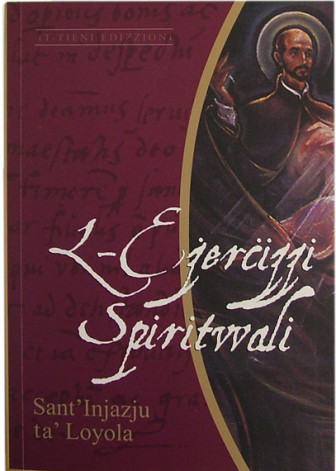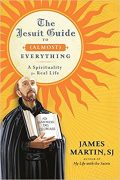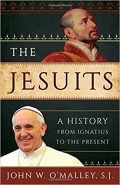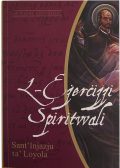
L-Eżerċizzi Spiritwali
Maqlub għall-Malti minn Pawlu Mallia SJ u Arthur G. Vella SJ
Sant’Injazju ta’ Loyola
A Review by Prof. Anthony J. Frendo
This splendidly produced book (which also has a number of lovely illustrations) is the second edition of the Maltese translation from the original Spanish autograph and the Latin version (called the Vulgate) of the Spiritual Exercises by Saint Ignatius of Loyola. The book is primarily meant as a handbook for retreat directors, though (given the necessary guidance) everybody who is eager to make a profound and radical spiritual experience can make use of it profitably.
The first edition in Maltese had been catered for by Revd Paul Mallia S.J. and Revd Dr Arthur G. Vella S.J. and was published in 1977. Although both the latter had started working together on the new edition, in fact Revd Mallia just made it to revise the translation in Maltese before passing away. This meant that Revd Dr Vella undertook the painstaking task of thoroughly revising and updating the notes, expanding the analytical index, and of drawing up an excellent glossary. The Maltese text is excellent, and Mr Saviour Mallia gave a helping hand in this sphere.
The book has two great merits: the first is that it provides an excellent version of Ignatius’ Spirtitual Exercises in Maltese; the second is that it contains extensive notes which are based on solid scholarship in the field of theology in general, and of spiritual theology in particular. Readers may comfortably bask in the sunshine of the latest theological research, which Revd Dr Vella has gleaned and presented lucidly and precisely.
There are references to Hans Urs von Balthasar (pp. 41-42), to the documents of the second Vatican Council (for example, on p. 70), to important historical sources (as on p. 65), as well as to works by Carlo Maria Martini and Josef Ratzinger (p. 110). The list could go on and on, and there is no doubt in my mind that the explanatory notes are so good that they are a must even for those who do not usually read many publications in Maltese. They convey a solid, clear, and important explanation of Ignatius’ text.
The Glossary certainly gives a helping hand in all this, since it takes up every technical term used by Ignatius and provides a succinct and precise explanation of it. Moreover, it also includes certain words which can be easily misunderstood nowadays. Thus, for example, Saint Ignatius insists that we should be indifferent to all creatures, including human beings, if we want to achieve the end of our existence which is God Himself. It is clear that to be ‘indifferent’ is not something positive in modern-day language; however, the Glossary makes it clear on page 188 that to be ‘indifferent’ in Ignatian terminology means to be free from every attachment which hinders us from reaching the end for which we were created.
There are other splendid explanations, such as the one offered for Ignatius’ phrase ‘to ask for what you desire’ which is explained (p. 195) in the context of the theology of grace, and thus of God’s free gift.
All the precious sources mentioned in the notes are listed in a separate Bibliography, printed separately. I must underscore the fact that this book is a gem; indeed, it should be on the shelf of every retreat director, and possibly on that of every committed Christian too.
Availability:
‘L-Ezercizzi Spiritwali – Sant’ Injazju ta’ Loyola’ is available for purchase from Mount St Joseph Retreat House, Mosta.


